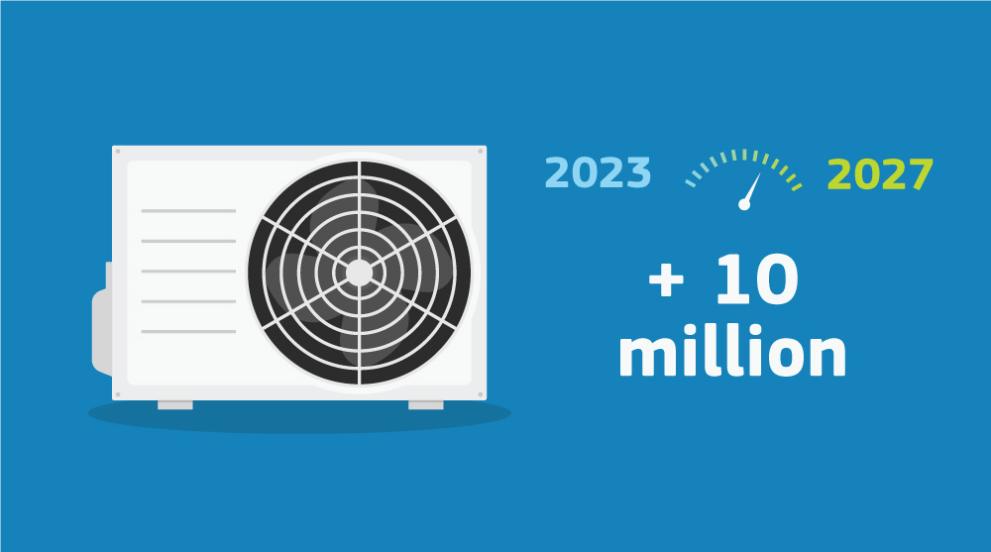According to Eurostat data, about 50% of all energy consumed in the EU is used for heating and cooling, and more than 70% still comes from fossil fuels (mostly natural gas). In the residential sector, around 80% of the final energy consumption is used for space and water heating. Heat pumps are a mature technology that is much more energy efficient than boilers. They allow greater use of renewable energy sources, ambient energy, and waste heat.
In buildings, heat pumps are used for heating, hot water, and in some cases also for cooling. Rather than producing heat, they extract and upgrade ambient energy (heat or cold from outdoor air and surface or sewage waters) or geothermal energy (heat or cold from the ground or groundwaters). The refrigeration cycle is in most cases a vapour compression cycle consuming electrical energy, but there are also sorption cycles that are heat driven.
EU roll-out of heat pumps
A report published in 2022 by the International Energy Agency (IEA) predicts that heat pumps will lower Europe’s gas demand for heating in buildings by at least 21 billion cubic meters in 2030.
Heat pumps can reduce the EU’s dependence on imported fossil fuels and facilitate the electrification and decarbonisation of our energy demand. Their market uptake has increased over the last decade, particularly during the energy crisis, but it should be further increased. In line with the EU Green Deal goals, the REPowerEU plan calls for frontloading investments in renewables and energy efficiency.
REPowerEU aims at reducing fossil fuel imports, doubling the current deployment rate of heat pumps in buildings and speeding up deployment of large district heating and cooling network heat pumps.
With 3 million heat pump units installed in 2022 alone, the objective is to install at least 10 million additional heat pumps by 2027.

The Heat Pump Accelerator Platform
To speed up the deployment rate of heat pumps, the Commission launched the Heat Pump Accelerator Platform in November 2024.
It will encourage industry experts, policymakers, and stakeholders to collaborate, share best practices and ideas, and jointly discuss measures that promote sustainable heating solutions.
Visit the Heat Pump Accelerator Platform
New skills
To ramp up the heat pumps production and their deployment and reach our 2030 climate goals, it is estimated that 750 000 more installers are needed and at least 50% of existing installers will have to be reskilled to work with heat pumps.
Investments
The total investment in heat pumps across the EU almost doubled from €13 billion in 2020 to €23 billion in 2023 despite a slow-down in 2023, due to cooling energy prices and subsidy cuts. (Source: BloombergNEF, March 2024)
Social Climate Fund
New financing instruments will support the roll-out of heat pumps. As of 2026, all EU countries will be able to benefit from the Social Climate Fund. It is an €86.7 billion EU Fund that will allow EU countries to support energy efficiency measures and the decarbonisation of heating and cooling in buildings, including the installation of heat pumps, for vulnerable households, in particular those in energy poverty, and micro-enterprises.
It is sourced by a dedicated share of the revenues from the auctioning of emission allowances under the new emissions trading scheme ('ETS2') that will put a carbon price on the fuels used in buildings, road transport and other sectors as of 2027, hence further strengthening heat pumps’ competitiveness. ETS2 will also provide significant auction revenues for EU countries to support the green transition, notably in the building sector.
Supporting rules and initiatives
The deployment of all kinds of heat pumps, in residential, industrial, and heat network applications, is necessary to meet our reinforced climate objectives. The Commission's competitiveness of clean energy technologies report from 2023 indicates that, together with research and innovation to improve the automation of heat pump installation, consolidating the manufacturing base in the EU would help drive down the upfront costs of heat pumps and boost EU global competitiveness.
However, without targeted measures at the EU, national, regional and local levels, 22 million old individual heating appliances and several thousand large old fossil-based heating units are at risk of being replaced by fossil boilers.
Implementing rules
The revised directives for renewable energy, energy efficiency and the energy performance of buildings, together with the Net Zero Industry Act, among others, provide strong policy signals for clean heating solutions, including efficient district heating and heat-pumps, and sets the path for gradually phasing out boilers powered by fossil fuels.
Speeding up the implementation of these laws across the EU countries is key to ensuring the heating sector undergoes the green transition. For example, the phasing out of financial incentives for stand-alone boilers powered by fossil fuels as of January 2025 will provide a strong incentive to shift subsidies to the deployment of non-fossil fuel heating appliances.
Energy labels
The Commission is also preparing modernised EU Energy Labels for heating and cooling appliances that will make it easier for consumers and installers to identify efficient models and compare between different types of appliances. This will help make the advantages of heat pumps more visible to consumers.
Related links
- RePowerEU plan
- European Green Deal
- Energy Performance of Buildings Directive
- Renewable Energy Directive
- Energy Efficiency Directive
- Renovation Wave
- Net-Zero Industry Act
- Heat Pump Accelerator Platform
- CORDIS Results Pack: Heat pumps promoting clean and energy efficient solutions for households (23/10/2023)
- Frequently asked questions - European heat pump association
- Have your say - heat pumps action plan
- JRC Publications Repository - Heat Pump Market: Country Fiches
